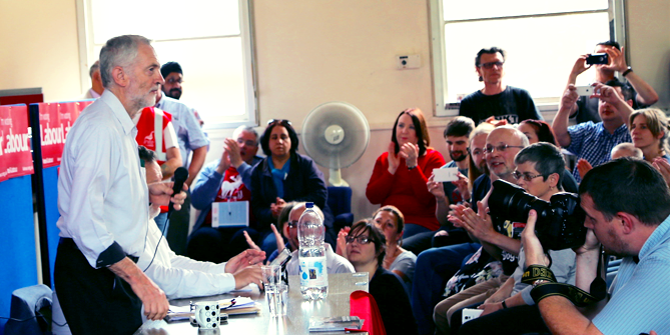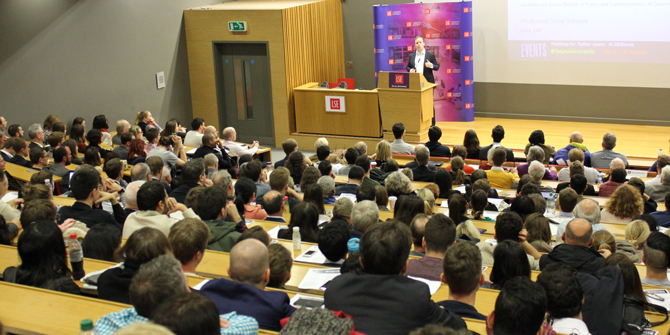
On Wednesday 3 February, Rosa Prince, Assistant Political Editor for the Telegraph, discussed her new book, ‘Comrade Corbyn: a very unlikely coup’ as part of the British Government @ LSE public lecture series. Third year Government student Tim Rogers gives his analysis of the event, and considers how Jeremy Corbyn rose from political outsider to Leader of the Labour Party.
The surprising and unstoppable rise of “Comrade Corbyn” in mid-2015 left many surprised.
How did this man, a veteran member of the Labour Party with no apparent designs on moving up in the political world, having held his Islington North seat in the Commons for over 30 years without a single ministerial position or promotion to his name, become the elected leader of the Labour Party and thus leader of Her Majesty’s Most Loyal Opposition? And moreover, why does this figure provoke such strong reactions amongst the public, from the Mail on Sunday suggesting “Prime Minister Corbyn and the 1,000 days that destroyed Britain” (imagining a Corbyn premiership), to the thousands who have been galvanised into becoming politically active, often for the first time, taking part in Corbyn’s “Momentum” political movement?
The Labour leadership election 2015
In her new book “Comrade Corbyn: A Very Unlikely Coup: How Jeremy Corbyn Stormed to the Labour Leadership”, Rosa Prince, an acclaimed journalist who was once involved in breaking the 2009 expenses scandal (which still echoes today, indeed quite possibly in Corbyn’s very success!), seeks to explain how Corbyn achieved his landslide victory in last summer’s Labour leadership elections, gaining 59.5% of the first-round vote having almost been accidentally nominated to the election in the first place by now-regretful members of the Parliamentary Labour Party (PLP). On 3rd February 2016, attendees at LSE were treated to a lecture by Rosa, seeking to provide an insight into the highlights of her book and her explanation of the “Corbynista” phenomenon, trying to answer two questions: “Who is this man”, and to put it as Donald Trump did, “What on earth is going on?” (That is, how did he get so suddenly to where he is now?!).
Rosa, as surprised as any, admitted that when she began to prepare to write a book on the next leader of the Labour Party (whoever that might turn out to be), she had not anticipated the Corbyn phenomenon. She began gathering notes on Yvette Cooper and Andy Burnham, as the Labour establishment candidates and presumed winners-in-waiting. But suddenly, things began to change at an alarming pace. As pressure built from the bottom-up on social media for a left-wing anti-austerity choice in the leadership election, an online petition was created that even Corbyn himself shared, as Rosa speaks of in a recent article. Once Corbyn put himself up as a potential candidate the buzz grew, leading to the gradual accumulation of the necessary nominations from the PLP. When Corbyn ascended to the top of the polls, Rosa was forced to change track and spend increasing amounts of time researching this surprising rising star.
Origins of the ‘unlikely coup’
Having not followed the tabloid press which spent much of the summer attacking Corbyn in every way possible – including analysing his middle-class roots – I missed talk of his so-called “posh past” – and Rosa indicated that she was just as surprised by his roots as I have been! Corbyn comes from an affluent middle-class background par excellence, growing up in a “manor” in leafy Shropshire and going to a grammar school (which he reportedly hated). But his parents were notably left-wing, having met as activists seeking to fight Franco in Spain, and so politics was discussed and debated in the family home. This decidedly non-proletarian background is perhaps a shock when we look at this veteran left-winger, and it certainly provided a headline or two, from the Telegraphs’s more sedate “Jeremy Corbyn, the boy to the manor born,” to the Daily Mail’s “Making of Comrade Corbyn: QUENTIN LETTS explains how Labour leader went from prep school boy raised in a manor house to rich-bashing friend of terrorists.” It is unsurprisingly tough to trace the development and evolution of Corbyn’s left-wing views, but Rosa points to his parents’ views and his experiences of volunteering in Jamaica, which took him out of his middle-class comfort zone to see the world and develop his strong principles of equality and internationalism which remain to this day.
Prince then sought to explain how Corbyn achieved his unexpected coup and took control of the Labour Party. Her approach, although not structured in this way, is a two-stage one: “What made Corbyn’s politics appealing?” and “How did he practically make victory happen?”
The lecture pointed to a number of political phenomena of the past decade which can help us to explain feeling in the Labour Party which allowed Corbyn to be elected.
One is the anti-austerity mood. After the financial crisis, Rosa suggests that many Labour members felt alienated as ordinary people took the brunt of cuts whilst it appeared to be “business as usual” for those at the top of society, the much-maligned “1%”. Rather than attempt to maintain electoral credibility by ceding to cuts as competitors like Andy Burnham -the left-wing-but-still-establishment candidate- did, Corbyn stuck to his principles (which Rosa suggested really do drive him, unlike his peers), challenging the dominant “we have to make cuts” narrative presented by other Labour leadership candidates. The move to the centre by Burnham, Cooper and other lead candidates reacting to the perceived ideological and actual electoral failure of the more left-wing leadership of Ed Miliband, provided space for Corbyn’s late entry and led to campaigns online as activists lobbied Labour MPs for them to nominate a left-winger so as to provide a “real alternative.” Corbyn ended up filling in that gap, maintaining an authentic anti-austerity voice in opposition to apparent “sell-outs”.
Secondly, Corbyn’s ideas and character fit in well with an anti-politics (or at least an anti-politics as usual mood) brought about by the expenses scandal. Corbyn had a distinct advantage in the sense of having been involving in politics-with-a-small-p for a long time, gaining a great deal of experience, but having avoided the stain of high elite politics, as someone clearly not hugely ambitious, power, or fame-hungry.
All this made him an ideal candidate – an experienced politician with a subversive anti-austerity narrative who could genuinely claim not to be part of the establishment.
As for practicalities, Prince highlighted Corbyn’s strong grassroots organisation – not least through social media – which far exceeded the quasi-professional campaign support relied upon by other candidates. Corbyn had a very strong activist network around him, having been involved in a number of left-wing causes over the years, most notably the Stop the War Coalition, in which he was instrumental in 2003’s march of over a million people on London. He met much of his campaign team there, who together experienced and practiced the kind of organisation needed for Corbyn’s bottom-up storming of the Party. This, combined with new Labour Party rules which allowed registered “supporters” to vote in the leadership election, allowed Jeremy to be a veritable force in the vote, with a strong personal following and experience of building and running social movements. The strong grassroots appeal of Jeremy Corbyn and the strength of his organisation were shown in the metamorphosis of his campaign into Momentum, “a network of people and organisations to continue the energy and enthusiasm of Jeremy Corbyn’s campaign”.
Future implications
For me, Rosa offered a convincing argument to explain Corbyn’s victory. However, it remains to be seen whether Corbyn’s radical agenda (even if not as radical as some papers would have you believe) will appeal to the wider public beyond the Labour Party faithful (and so-called “supporters” who paid their £3).
The structure of the Labour Party matters, with its undoubted tendency to attract into its membership the more extreme voices, and its newly inaugurated one-member-one-vote electoral system which provided an unprecedented voice to members (at the expense of MPs who actually have to work with their leader!), and who perhaps have incentives better aligned to Labour’s long-term electability.
Widening his appeal will be Corbyn’s biggest challenge (perhaps alongside developing a more productive relationship with the rest of the parliamentary party), as he seeks to validate his victory achieved through his bottom-up appeal to the left. The New Statesman concludes that under Corbyn, Labour “…now seems to have retreated even from the position of fragile and limited recovery it thought it was enjoying early in the last Parliament.” Will this change, as Corbynmania spread to the masses and turn the Labour Party once again into a veritable political force which can win elections? As yet, this, and Corbyn’s leadership itself, remains unclear.
 Tim Rogers is a third year BSc Government student in the Department of Government at the LSE. A podcast of the event Comrade Corbyn: a Very Unlikely Coup is available on the LSE website. For more information about undergraduate courses in the Department of Government, please visit our website.
Tim Rogers is a third year BSc Government student in the Department of Government at the LSE. A podcast of the event Comrade Corbyn: a Very Unlikely Coup is available on the LSE website. For more information about undergraduate courses in the Department of Government, please visit our website.
Note: this article gives the views of the author, and not the position of the Department of Government, nor of the London School of Economics.





